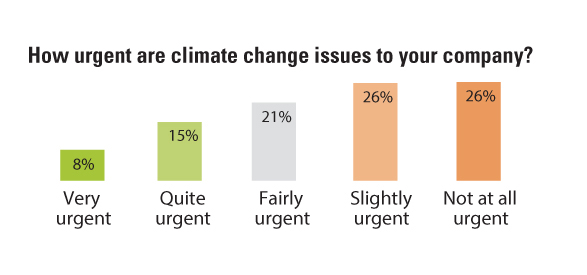How Serious Is Climate Change to Business?
Our fifth annual survey on sustainability suggests that climate change has yet to become a very urgent issue for most companies — and that only a minority of companies are preparing for its effects.
Topics
Leading Sustainable Organizations
Within the scientific community, climate change is increasingly seen as one of the most important long-term issues facing humanity. The Intergovernmental Panel on Climate Change, an international scientific group recognized as an authority on climate change and its risks, wrote in a recent draft of a forthcoming report that human activity has almost certainly caused average global temperatures to increase during the second half of the twentieth century and that sea levels could rise by as much as three feet by the end of this century.1
In light of grave scientific concern with climate change — and its likely effects on the planet and on economic activity — how are managers thinking about this issue?
Few studies have explored how managers are thinking about the connection between climate change and their businesses. In the fifth annual global executive survey about sustainability and innovation conducted by MIT Sloan Management Review and the Boston Consulting Group in June 2013, more than 1,800 managers from a wide variety of industries and countries offered their views on how sustainability is influencing their corporate strategies, including approaches to climate change.
Some of the results, presented here, indicate that climate change has yet to become a very urgent issue for most companies and that only about one-third believe they are prepared for climate-change-related impacts. In an upcoming report (due out in the fourth quarter of 2013), we will discuss these results in greater detail, along with additional survey findings about how sustainability is influencing corporate strategies.
Few Companies View Climate Change as Very Urgent

A Minority of Managers Believe Their Companies Are Prepared
References
1. J. Gillis, “Climate Panel Cites Near Certainty on Warming,” New York Times, Aug. 19, 2013.

